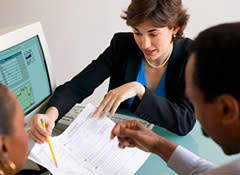How to find a good tax preparer

Tax preparers have varying levels of expertise and charge accordingly. A good tax preparer will ease stress and might save you some money as well, here’s what you need to know in order to get the most value for your tax-prep dollar.
According to a recent survey by the National Society of Accountants, solo tax preparers charged an average of $226 for the usual itemized federal form 1040 and state income-tax form last tax season, compared with $260 for preparers at larger firms with three or more full-time staffers. These are your basic tax-prep choices:
Certified public accountants: Not all CPAs specialize in doing individual income-tax returns, so ask up front. To find a CPA, check with friends and neighbors or go to the American Institute of Certified Public Accountants website. Under "For the Public," click on "Find a CPA."
Enrolled agents: Unlike CPAs, who can handle a variety of financial activities, EAs focus solely on taxes. They must have worked for the IRS for at least five years or passed exams on tax codes and calculations. Enrolled agents might work for themselves or in a CPA firm or storefront office. To locate one, go to the website of the National Association of Enrolled Agents.
National tax-prep chains: Storefront operations like H&R Block, Jackson-Hewitt, and Liberty Tax Service can be adequate for simple, straightforward returns, and they’re relatively inexpensive. In 2011, for instance, the average fee per client at H&R Block was $183. The not-for-profit National Consumer Law Center says national chains are less likely than independent storefront tax preparers to hit you with "junk" fees, such as application and document-prep charges. Preparers in franchise offices of the national chains have usually passed at least a several-week course, and newcomers’ work is reviewed by experienced supervisors, according to the companies.
Free tax prep: If your household income was low to moderate for your community or you’re 60 or older, you might not have to pay anything for tax help. The AARP Foundation Tax-Aide service will pair you with trained volunteers who can handle Form 1040 and schedules A and B.
Before you sign up with a preparer, ask some basic questions including: Do you have a preparer tax-identification number; what are your credentials; what kinds of clients do you usually work with; can you give me a price quote; and do you provide audit help.
Tobie Stanger, a senior editor for Consumer Reports Money Adviser says, "Look for someone with at least seven years’ experience. You want someone who’s handled a variety of tax situations, in both good and bad economic times." Questionable tax return preparers have been known to skim off their clients’ refunds, charge inflated fees, and promise guaranteed or inflated refunds. According to the IRS, you could be dealing with an unscrupulous return preparer if they: Don’t sign the return or put a preparer tax identification number on it; don’t give you a copy of your tax return; promise larger than normal tax refunds; charge a percentage of the refund amount as a preparation fee; require you to split the refund to pay the preparation fee; add forms to the return you have never filed before; or encourage you to place false information on your return.
For more about how to choose a good tax preparer see the full article, at our Consumer Reports’ Money section.
Previous tax coverage:
5 tips to follow before starting your taxes online
Don’t be tempted by tax refund anticipation loans or checks
8 ways to make tax season more tolerable
Top tax scams and how to avoid them
Tips For Choosing A Tax Preparer [IRS]
Consumer Reports has no relationship with any advertisers on Yahoo!
Copyright © 2008-2012 Consumers Union of U.S., Inc. No reproduction in whole or in part without written permission.
More From Consumer Reports


